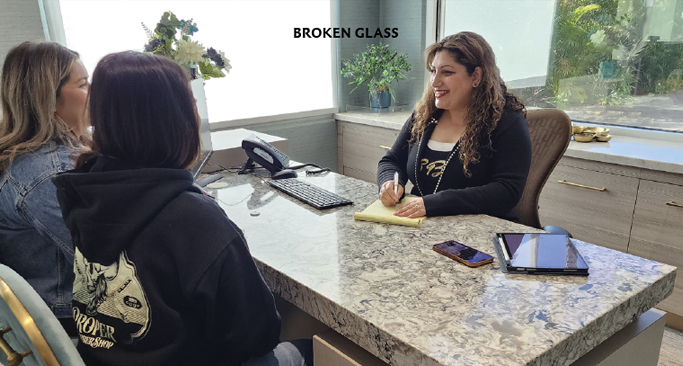Insurance—an industry of opportunity—
offers flexibility and possibility for a new generation of women
By Rajni Kapur
I moved from India to the United States in 1999. In the 25-plus years since then, the insurance industry—an industry that I, like so many others, stumbled into unintentionally—has shaped my life and my family’s financial well-being.
Before I entered the industry, my knowledge of insurance was limited to what my husband told me about his work as an agent for Farmers Insurance. I had no other frame of reference for or understanding of the industry.
The Kapur family (Harish, Jamal, Keshav,
Shivani and Rajni) on Rodeo Drive in
Beverly Hills during Christmastime.
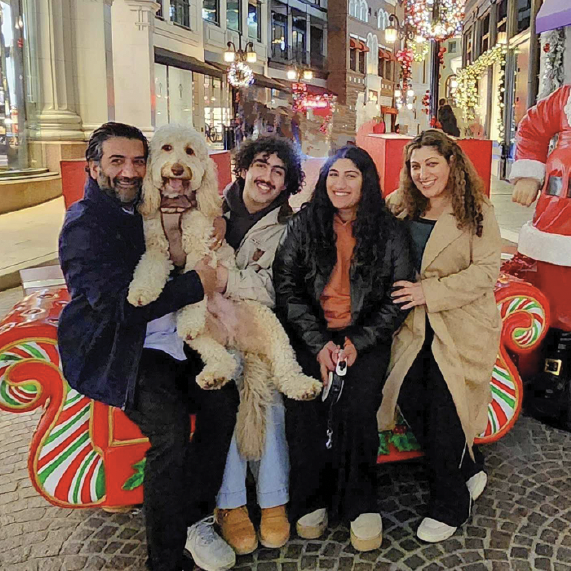
No one I knew in India had auto insurance, home insurance, or even health insurance. That’s because, historically, insurance penetration in my native country has been extraordinarily low, although that is changing.
My professional journey
I wasn’t supposed to be in insurance. I was trained to be an accountant and I had earned a degree in business management. My plan was to reinvent my life in the United States with my husband, start a family, and continue my accounting career.
However, because my overarching priority in my early days here was to earn a living and pay bills, I ended up taking a job selling fire extinguishers door-to-door. Surprisingly, I enjoyed the work because I liked to interact with people. In my first month, I was named “Top Gun of the Month.”
But honestly, who could imagine selling door-to-door fire extinguishers as a pathway to the American Dream, much less paying the bills on a consistent basis? So, I kept looking in between knocking on doors, and eventually I landed a job as a senior accountant.
In time, my husband, Harish, and I learned we would be having our first child—a little girl we named Shivani. The initial plan was for Harish’s parents to help with the baby when I went back to work.
His father had brought the family to the U.S. years earlier, when he relocated here for his job. Now retired, Harish’s dad wanted to return home to India—something he had dreamed of for years—so we needed a new plan.
Like so many families, we simply couldn’t make ends meet on one income. But with childcare being so expensive—and something I personally did not want for my children—it became clear that returning to a corporate accounting role would be a challenge.
My introduction to insurance
As our plans changed, Harish had found consistent success with his Farmer’s agency but was experiencing growing pains. After considerable debate, I went to work as his assistant, handling back-office tasks so he could grow his book of business. After all, the accounting skills I had developed were transferable.
Like many others who come to the industry from a different sector, I quickly found insurance offered me the flexibility to balance work and family. I was fortunate to build much of my schedule back then around Shivani. Data entry, processing quotes, completing applications, reviewing loss reports and the like were all tasks I could easily complete while she slept.
I would rock Shivani in my arms while talking to clients on the phone. And once she was down for the night, I would catch up on work and study to learn more about the industry.
Something that is talked about in insurance a lot is that it is a relationship business. And that is the truth of it. Fortunately, in part thanks to my fire extinguisher sales days, I knew I had good interpersonal skills, which are the building blocks of relationship building.
Moreover, there were numerous roles within insurance where I could transfer and apply my inherent people skills. Calling clients, deepening our agency’s relationships with those clients, and working with the Farmer’s customer service team were all ways I was able to contribute to our success, while learning about the more technical side of insurance—things like endorsements, billing, coverages, claims and more.
This gave me the confidence to move beyond a behind-the-scenes role and, in 2004, I received my agent’s license and began writing policies on my own. Soon, my closing rate was over 90%, which is about 70 points higher than the national average of 20%.
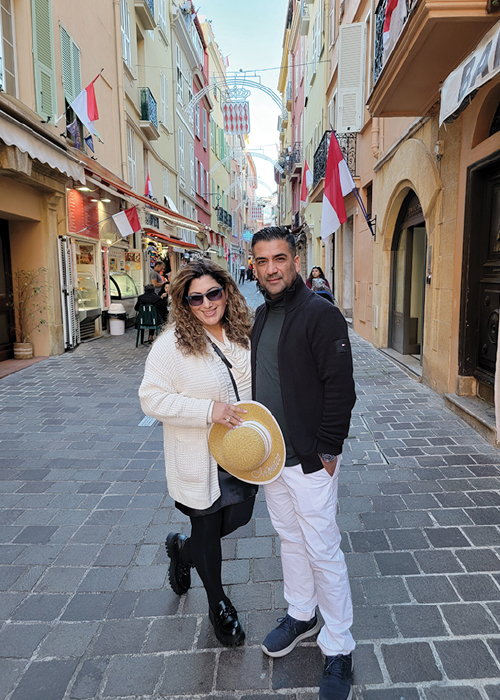
Rajni and Harish celebrate
their 25th wedding anniversary in Monaco.
Overcoming the challenges
A quarter century in insurance has dramatically shaped my views on work-life integration, as well as career opportunities for women and immigrants like me. Today, I am fortunate to be able to share my enthusiasm for our industry by mentoring other women and telling them about the tremendous possibilities that await them in insurance.
It wasn’t always easy. While many people might welcome a little one in the office, others would ask me directly, “Shouldn’t you take some time off to stay home with your baby?” That was tough to take. On one hand, I didn’t want to give up having a career, so I appreciated the flexibility insurance provided to pursue my professional ambitions without leaving my daughter in the care of others. But that question, when it would come up, made me question my decision to pursue a career.
To be honest, in those early years, I didn’t have the luxury of being a stay-at-home mom. We were making our way in our chosen country, so I had to—and wanted to—contribute to our family’s success.
Another challenge newcomers to the insurance industry may face is building credibility. Not only was I a woman entering the business, but I also had an accent and looked young. Clients seemed reluctant to trust that I could speak about a complex subject like insurance, with all its intricacies.
I learned the best way to combat this challenge is to make yourself as knowledgeable as possible. Learn everything you can about your company, your products, your clients and the greater insurance market. When my customers realized I knew what I was talking about—and could help them find solutions—they began to see my value.
Finding allies is a key to success
for those who come to insurance
from other backgrounds or industries.
(Right) Harish and Rajni
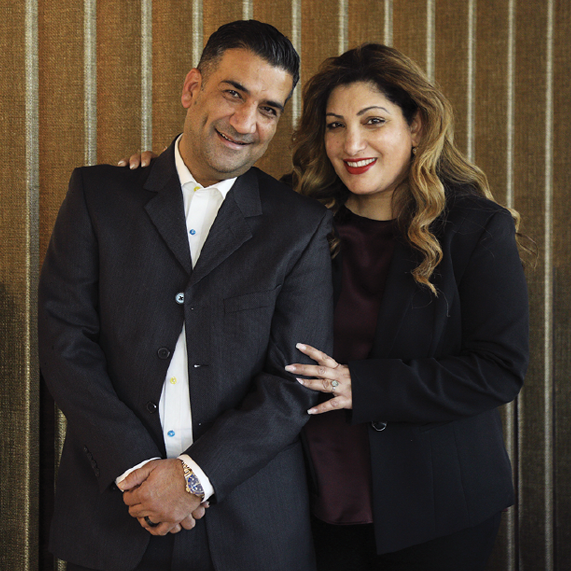
Overcoming these obstacles taught me resilience and determination. It also helped me develop a strong work ethic and improve my problem-solving skills, all of which paid dividends when Harish and I launched our own independent agency, All Solutions Insurance, LLC in 2004.
All Solutions Insurance started with auto and home, and then moved into commercial lines. Throughout our time building the agency, we worked hard to stay knowledgeable about our carrier partners and kept ourselves open to new business. This steady, methodical approach, coupled with staying open-minded to new opportunities, made the difference.
And as Harish began launching other insurance businesses when new opportunities presented themselves, I grew from a co-founder and business partner into a CEO.
Enlisting support
Finding allies is a key to success for those who come to insurance from other backgrounds or industries. Long before I could even imagine myself as a CEO, much less an experienced insurance professional, formal mentorship programs for women were hard to find. But I still managed to find people, informally, who helped lift me up.
My best resources were customer service and marketing representatives from other companies. For example, a marketing representative at a carrier partner offered me valuable tips for cross-selling that I still use today. Admitting what I didn’t know and asking for help taught me that when you put your ego aside and just ask, most people will genuinely want to help.
More recently, I have been fortunate to connect with many female mentors who have shared their time and talent with me. As women, we need to support each other and celebrate our successes.
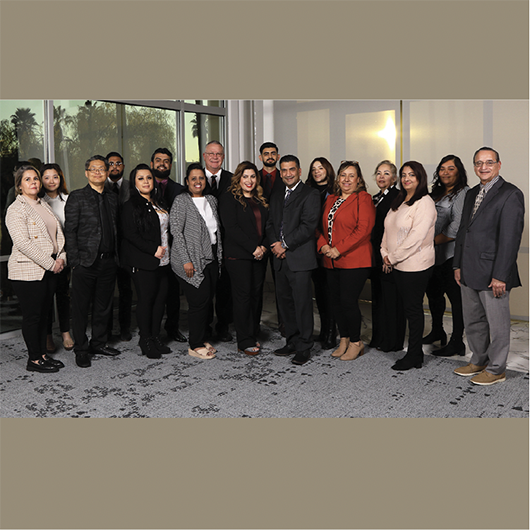
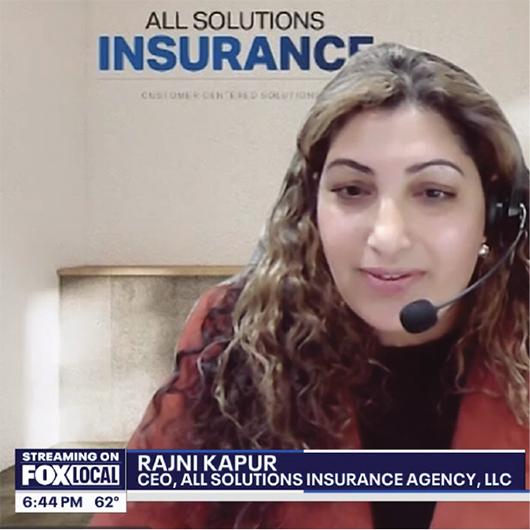

and safety amidst the Greater Los Angeles wildfires in January.
The empathy that comes from being a parent also helped me consider the various ways—beyond policies and underwriting—that I might help others. Throughout my career, I met many women who I suspect felt similarly. They offered their time, their advice and sometimes a sympathetic ear.
That’s one of the secrets to being successful in business, whether you are a man or a woman: helping others simply because you can and seeking nothing in return.
I also encourage other women in the independent agency arena to connect with the next generation. Women entering our industry today can work in any number of roles that meet their personal interests and skill sets. Hopefully, they can also find the work-life balance that I did. Or they can become entrepreneurs and start their own independent agency with a bit of mentoring, guidance and their own determination.
Success secrets
There is so much opportunity in insurance. However, seizing it requires planning and guidance. When I talk with young women, I recommend that they take these steps to maximize their career success:
- Be patient with yourself. It takes time to build your knowledge in insurance. Learn the basics first.
- Stay educated. I believe it’s critical for women to earn a degree, then continue learning throughout their lives.
- Tap into your unique skill set. I was able to apply my financial acumen as an accountant to watch our loss ratios, generate high-quality business for our clients and carrier partners, and achieve consistent performance. Many skill sets correlate well with insurance.
- Surround yourself with tenacious achievers. Follow the examples of those who strive to do better, particularly other women. They will inspire you to challenge yourself.
- Recommend new ways of doing business. Develop your skills in areas like AI, then show your colleagues how they can use those skills to make their business processes better.
It is my wholehearted belief that insurance is one of the best careers for women. You don’t need a large investment of time or money to begin; many skill sets translate, and it is a field that offers flexibility.
All you need is a little bit of motivation, a thirst for knowledge and the willingness and ability to adapt—as I have—when circumstances present themselves.
The author
Rajni Kapur is the CEO of All Solutions Insurance, LLC, one of the largest independently owned insurance agencies in California, placing more than $5 million in annual premiums. Rajni can be reached by email at rajnik@allsolins.com.

